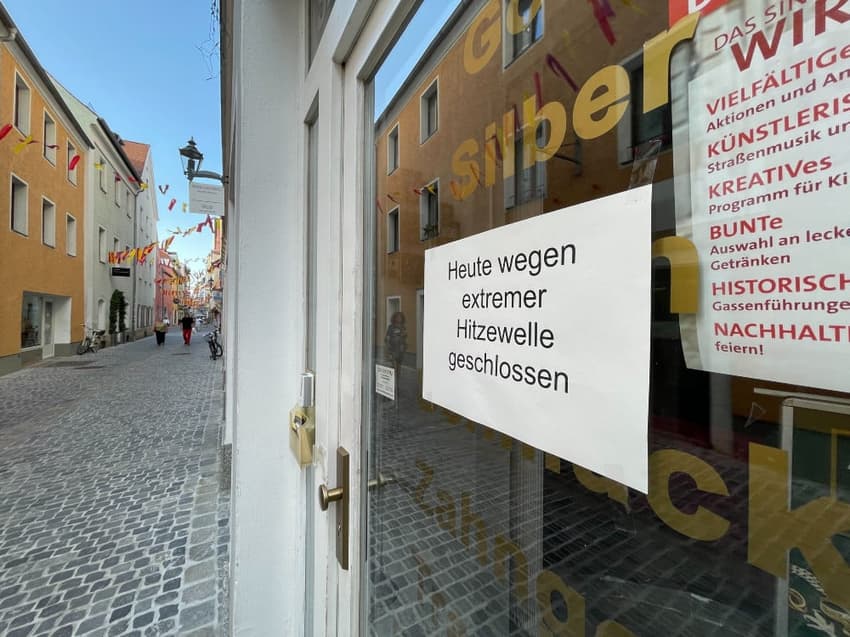10 things I found shocking as an American after moving to Germany

Moving countries generally involves a bit of a culture shock, but there are certain things that regularly surprise Americans about Germany. American journalist Rachel Stern recalls her biggest shocks on moving to the Bundesrepublik.
There are around 120,000 Americans living in Germany, according to Destatis. When I joined their ranks and moved to the Bundesrepublik a decade ago, I was in for a slew of sometimes very unexpected culture shocks.
Here's what stood - and still stands out - to me the most.
No tap water
At restaurants in the US, it's not only the norm to receive a large glass of tap water filled to the brim, but for waiters to continually refill it. The first time I asked for Leitungswasser in Germany, the server staunchly replied, "If I give you tap water, I'll have to give all my customers tap water," after which I reluctantly forked out a few euros for a bottle.
Restaurants in Germany still make a significant deal - and sometimes even most of - their profits through drinks so it's usually expected that customers pay for them, including good ‘ol H20.
READ ALSO: Four things to know about tap water in Germany

A glass of tap water can be controversial in Germany. Photo: 21 swan/unsplash
The famous Feierabend
Towards the end of my first day working in a German office, I overheard many colleagues wishing each other "Schönen Feierabend" (literally, "Have a nice celebration evening"). I googled if Germany had some sort of national holiday, as what else could they be celebrating?
Little did I know that this was simply a word reserved for the time you're clocking off work for the day - and really only focused on friends, family or relaxing without attempting to answer one last client email. While more Germans may have adopted the American workaholic way, this is still a treasured concept - and ubiquitous phrase.
READ ALSO: Why every country should get on board with the German Feierabend
No AC
During the summer in the same office, I found myself in sweltering heat as I waited for a whish of cool air from a rotating fan. “Why can’t they just install an air conditioner?” I begrudgingly asked myself. But then I thought of the days working in the US in the height of summer, when I wore a sweater inside as polar air blasted.
Maybe the German way was indeed more sensible (not to mention healthier and environmentally friendly).
READ ALSO: Ditching AC for ‘Hitzefrei’: Taking on the German summer as a Californian
Paid sick leave
In the US, employees usually get a maximum of five paid sick days, leading many to dig into a very limited number of vacation days - or just show up at work sneezing incessantly into a collection of crumbled tissues.
So the first time I had a minor operation in Germany, I was stunned when the doctor wrote me six weeks of sick leave - an amount that the employer pays 100 percent before your health insurance takes over at 70 percent for up to six months.
It was also a relief to see that my German colleagues had no qualms about calling in sick for a common cold, as opposed to the American attitude of showing up at the desk no matter what.
READ ALSO: Herbal tea and sick leave: An American’s ode to the German attitude towards health

Germans embrace sick leave - which is helped by the fact that they get a lot of it. Photo by David Mao on Unsplash
Smoking
Coming from California, I'm aware that one kind of smoking is quite popular. But the kind involving tobacco is pretty taboo after years of public health outreach campaigns. In California, the percentage of adults who smoked was 8.9 percent in 2020, compared to the US national average of 15.5 percent. But in Germany one in three people above the age of 14 smokes, according to the latest figures.
So it was a shock for me to see so many people strolling down the street smoking, which is prohibited on any public sidewalk or walkway in California. I was in for an extra element of surprise at how many of them also carried a Wegbier, or to-go beer, another Verbot in the US, unless you’re in the centre of Las Vegas. And don’t even get me started on all of the smoke-filled bars, which made me feel like I was stepping back in time to the US of the 1970s.
Opening hours (or lack thereof)
In the convenience culture in the US, many stores are only closed during the earliest of morning hours, or amid the apocalypse.
Yet when I arrived in Germany in August I was surprised to see that many shops hung a sign declaring they'd gone on holiday for a month. Even in the middle of bustling Berlin I often see businesses decide when they'll open or close based on circumstances ranging from the weather or too many unavailable workers.
Dining habits
During my first dinner among a table full of Germans at a pizzeria, I eagerly dug into a cheesy slice with my hands. But then I felt abashedly barbaric as I watched my culinary counterparts slowly cutting into my favourite finger food with a fork and knife.
Americans tend to only simultaneously use these two utensils when they're absolutely needed - say, cutting into a steak - whereas I noticed how many Germans will even neatly part their salad leaves with a butter knife.
READ ALSO: Oh fork: The German dining etiquette Americans might struggle with

Pizza is not always a finger food in Germany. Image by Matteo Orlandi from Pixabay
Manual cars are the norm
Manual cars are more of a novelty in the US but in car-loving Germany they're commonly used and often a source of pride. The first time I rented a car in Germany, I didn't expect to wait two hours as the dealer called around, trying to find an automatic Auto for this odd customer, unable to manouever the standard stick. "Sie ist Amerikanerin," I overheard the employee say, perhaps the best justification.
More and more automatic cars are now hitting the road: in 2010, they accounted for 27.4 percent of cars produced in Germany, according to the German Automatic Trust, and are now nearly 50 percent. But that's still a far cry from the US, where only three percent of people drive a stick shift.
You can only buy drugs at pharmacies
I noticed that German stores like DM or Rossmann were similar to the American CVS or Rite-Aid - until it came time to buy over-the-counter or prescription drugs. I realised I couldn’t just pick up cough syrup along with a pair of beach flip flops and more shampoo. Rather this would require waiting orderly in a queue at an Apotheke, which of course had very specific opening hours - and certainly not on Sunday when I most needed the medicine.
READ ALSO: Why are medicines in Germany only available at pharmacies?
Abundant parental leave
OK, this wasn't something that I really thought about when moving to Berlin as a mid-twentysomething. But several years later, I found myself grateful to have landed in a country where a year of paid parental leave is the norm, rather than a meager three months of unpaid leave (if you’re lucky) in the US.
This was coupled with other parental perks such a Kindergeld (a monthly allowance which increases with each child) and a free daycare (Kita) spot from the age of one. When I contrast this with the exorbitant costs of childcare in my home country, I’m (pleasantly) surprised.
READ ALSO: From Elternzeit to midwifes: An American’s view on having a baby in Germany
Comments
See Also
There are around 120,000 Americans living in Germany, according to Destatis. When I joined their ranks and moved to the Bundesrepublik a decade ago, I was in for a slew of sometimes very unexpected culture shocks.
Here's what stood - and still stands out - to me the most.
No tap water
At restaurants in the US, it's not only the norm to receive a large glass of tap water filled to the brim, but for waiters to continually refill it. The first time I asked for Leitungswasser in Germany, the server staunchly replied, "If I give you tap water, I'll have to give all my customers tap water," after which I reluctantly forked out a few euros for a bottle.
Restaurants in Germany still make a significant deal - and sometimes even most of - their profits through drinks so it's usually expected that customers pay for them, including good ‘ol H20.
READ ALSO: Four things to know about tap water in Germany

The famous Feierabend
Towards the end of my first day working in a German office, I overheard many colleagues wishing each other "Schönen Feierabend" (literally, "Have a nice celebration evening"). I googled if Germany had some sort of national holiday, as what else could they be celebrating?
Little did I know that this was simply a word reserved for the time you're clocking off work for the day - and really only focused on friends, family or relaxing without attempting to answer one last client email. While more Germans may have adopted the American workaholic way, this is still a treasured concept - and ubiquitous phrase.
READ ALSO: Why every country should get on board with the German Feierabend
No AC
During the summer in the same office, I found myself in sweltering heat as I waited for a whish of cool air from a rotating fan. “Why can’t they just install an air conditioner?” I begrudgingly asked myself. But then I thought of the days working in the US in the height of summer, when I wore a sweater inside as polar air blasted.
Maybe the German way was indeed more sensible (not to mention healthier and environmentally friendly).
READ ALSO: Ditching AC for ‘Hitzefrei’: Taking on the German summer as a Californian
Paid sick leave
In the US, employees usually get a maximum of five paid sick days, leading many to dig into a very limited number of vacation days - or just show up at work sneezing incessantly into a collection of crumbled tissues.
So the first time I had a minor operation in Germany, I was stunned when the doctor wrote me six weeks of sick leave - an amount that the employer pays 100 percent before your health insurance takes over at 70 percent for up to six months.
It was also a relief to see that my German colleagues had no qualms about calling in sick for a common cold, as opposed to the American attitude of showing up at the desk no matter what.
READ ALSO: Herbal tea and sick leave: An American’s ode to the German attitude towards health

Smoking
Coming from California, I'm aware that one kind of smoking is quite popular. But the kind involving tobacco is pretty taboo after years of public health outreach campaigns. In California, the percentage of adults who smoked was 8.9 percent in 2020, compared to the US national average of 15.5 percent. But in Germany one in three people above the age of 14 smokes, according to the latest figures.
So it was a shock for me to see so many people strolling down the street smoking, which is prohibited on any public sidewalk or walkway in California. I was in for an extra element of surprise at how many of them also carried a Wegbier, or to-go beer, another Verbot in the US, unless you’re in the centre of Las Vegas. And don’t even get me started on all of the smoke-filled bars, which made me feel like I was stepping back in time to the US of the 1970s.
Opening hours (or lack thereof)
In the convenience culture in the US, many stores are only closed during the earliest of morning hours, or amid the apocalypse.
Yet when I arrived in Germany in August I was surprised to see that many shops hung a sign declaring they'd gone on holiday for a month. Even in the middle of bustling Berlin I often see businesses decide when they'll open or close based on circumstances ranging from the weather or too many unavailable workers.
Dining habits
During my first dinner among a table full of Germans at a pizzeria, I eagerly dug into a cheesy slice with my hands. But then I felt abashedly barbaric as I watched my culinary counterparts slowly cutting into my favourite finger food with a fork and knife.
Americans tend to only simultaneously use these two utensils when they're absolutely needed - say, cutting into a steak - whereas I noticed how many Germans will even neatly part their salad leaves with a butter knife.
READ ALSO: Oh fork: The German dining etiquette Americans might struggle with

Manual cars are the norm
Manual cars are more of a novelty in the US but in car-loving Germany they're commonly used and often a source of pride. The first time I rented a car in Germany, I didn't expect to wait two hours as the dealer called around, trying to find an automatic Auto for this odd customer, unable to manouever the standard stick. "Sie ist Amerikanerin," I overheard the employee say, perhaps the best justification.
More and more automatic cars are now hitting the road: in 2010, they accounted for 27.4 percent of cars produced in Germany, according to the German Automatic Trust, and are now nearly 50 percent. But that's still a far cry from the US, where only three percent of people drive a stick shift.
You can only buy drugs at pharmacies
I noticed that German stores like DM or Rossmann were similar to the American CVS or Rite-Aid - until it came time to buy over-the-counter or prescription drugs. I realised I couldn’t just pick up cough syrup along with a pair of beach flip flops and more shampoo. Rather this would require waiting orderly in a queue at an Apotheke, which of course had very specific opening hours - and certainly not on Sunday when I most needed the medicine.
READ ALSO: Why are medicines in Germany only available at pharmacies?
Abundant parental leave
OK, this wasn't something that I really thought about when moving to Berlin as a mid-twentysomething. But several years later, I found myself grateful to have landed in a country where a year of paid parental leave is the norm, rather than a meager three months of unpaid leave (if you’re lucky) in the US.
This was coupled with other parental perks such a Kindergeld (a monthly allowance which increases with each child) and a free daycare (Kita) spot from the age of one. When I contrast this with the exorbitant costs of childcare in my home country, I’m (pleasantly) surprised.
READ ALSO: From Elternzeit to midwifes: An American’s view on having a baby in Germany
Join the conversation in our comments section below. Share your own views and experience and if you have a question or suggestion for our journalists then email us at [email protected].
Please keep comments civil, constructive and on topic – and make sure to read our terms of use before getting involved.
Please log in here to leave a comment.